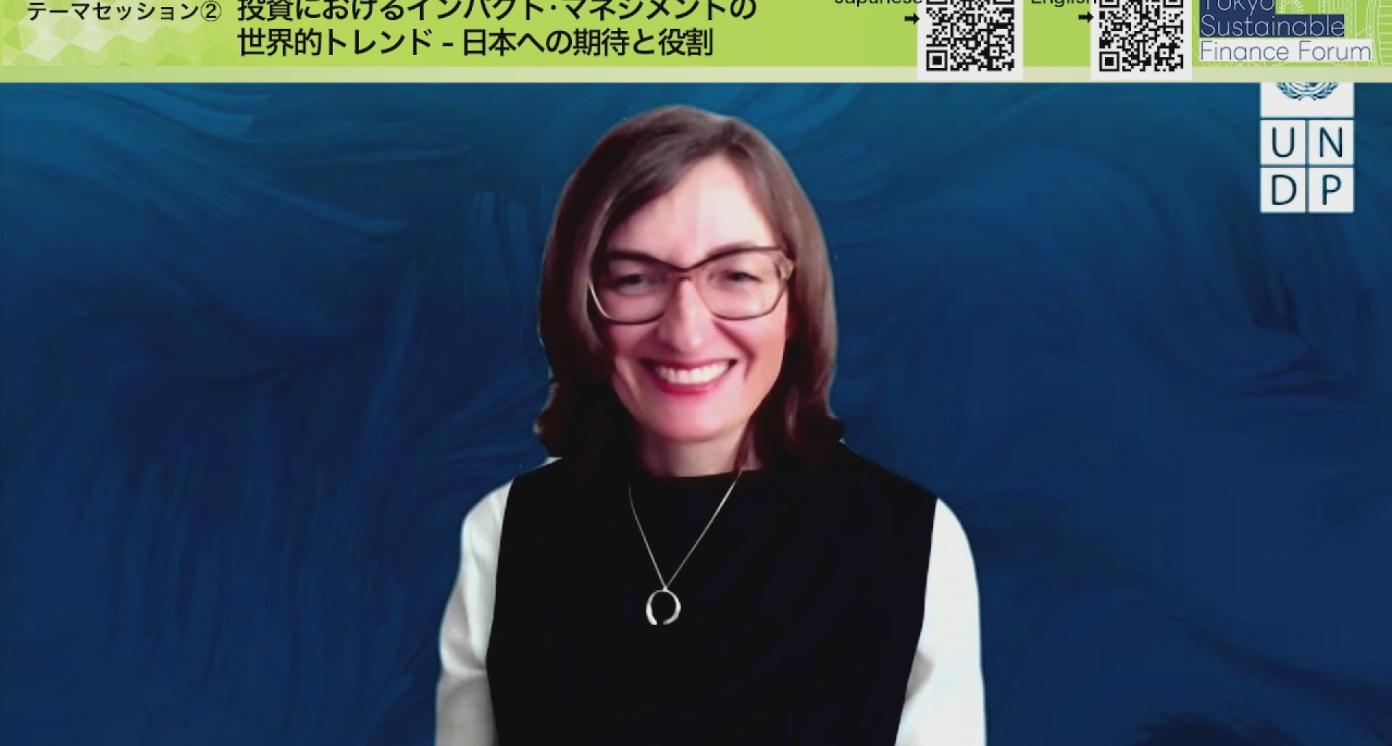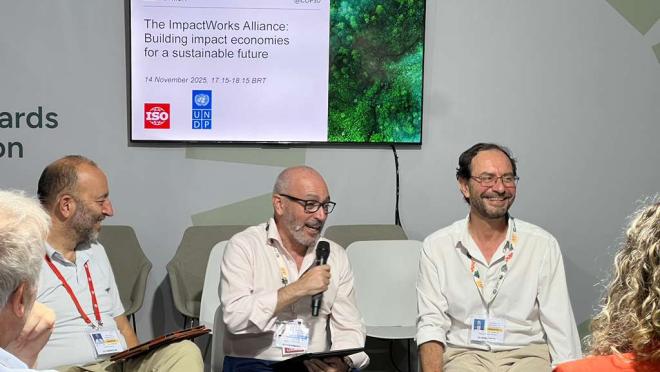Fabienne Michaux, director of UNDP SDG Impact addressed the Tokyo Sustainable Finance Forum on the global trends in impact management for investments, expectations and the role of Japan.
As prepared for delivery.
- Good afternoon everyone. It’s a pleasure to be invited to participate in this year’s Tokyo Sustainable Finance Forum.
- Today I’m going to talk a little bit about what we are observing and sensing in terms of global trends in impact management. And then talk a bit about expectations and the role of Japan.
- At the global level this past year, there has been a lot of focus on sustainability related reporting driven in large part by the new EU regulations and release of the ISSB’s new sustainability reporting framework.
- From an investment perspective, the spotlight has also been firmly on ESG and sustainability labelled products, with increasing scrutiny of claims made by the managers of those products in that regard.
- We thought that this might be a risk for impact management, diverting attention and energy away from it. But while this may be so to a certain degree, especially for organizations in the first wave affected by these new regulations, it is far from the whole story.
- More people are increasingly questioning why it is that while the amount of assets under management invested in ESG strategies continues to grow – that at the midway point to the 2030 Agenda, we are not on track to achieve the SDGs and going backwards in many areas.
- There is increasing awareness that we are not on a sustainable path and that this will have implications not only for people and planet, but for the future viability and performance of enterprises and investments.
- Apparently, not only do the SDGs need the private sector to have a shot at being realised, the private sector needs progress to be made on the SDGs to ensure its own future.
- The 2023 World’ Economic Forum’s assessment of top economic risks underscores this shift – most of the top risks identified are environmental or social in nature with economic consequences, rather than economic risks per se.
- Whereas even a year ago, I would start most conversations with an explanation of what impact management is, why it is different from and at least as important as reporting, why there is more to impact management than impact measurement – this wheel is slowly turning.
- We are observing an expanding focus of the need to translate sustainability and impact intentions and commitments into action – anchored by renewed commitment to the 2030 Sustainable Development agenda and the Sustainable Development Goals and a realization that what we are currently doing is not enough.
- A realization that our current approaches will not get us from where we are to where we need to go in the time we have left to get there. That sound internal impact management systems are needed to support robust sustainability reporting.
- Impact management is increasingly being understood as the missing middle, the mechanism we need to help us get there.
- The need to understand and manage our impacts on people and the planet, to contribute towards sustainable development and achievement of the SDGs is becoming better appreciated and well beyond the realms of impact investors and social enterprises. The fact that we are now working with ISO to translate the SDG Impact Standards into an ISO International Management System Standard is further evidence of this shift.
- The UN Secretary General earlier this year said a fundamental reform of the international financial architecture is crucial for effective development financing and the fight against climate change. Impact management will need to be at the heart of that reform to be effective.
- In June this year, the Impact Management Platform which UNDP is part of, released its report “The Imperative for Impact Management” underscoring the systemic nature of the relationship between the economy, people and the environment and the limitations of taking a narrow approach to addressing sustainability issues focused solely on the management of entity-specific (often short term financially material) risks. It calls on:
- Enterprises, investors and financial institutions to adopt impact management in order to operate sustainably, increase well-being and mitigate idiosyncratic and system-wide risks and
- Governments to encourage and enable the mainstreaming of impact management in order to achieve global policy objectives including the Paris Agreement, the Kumming-Montreal Global Biodiversity Framework and the SDGs.
- As many of you who have been following our SDG Impact journey thus far know, this is exactly why we developed the SDG Impact Standards – to help businesses and investors put sustainability and the SDGs at the core of purpose and management decision-making in a holistic, systematic, and targeted way and moving away from a more ego-centric to eco-centric view of our place in the world.
- In the impact investment space, more Private Equity funds are focusing on impact management as highlighted in the GIIN’s 2023 GIINSIGHT Impact measurement and management practice report, and EVPA’s most recent survey – both of which show increasing take up of the SDG Impact Standards, which is pleasing.
- We are also seeing first-hand private equity funds using the 12 actions of the SDG Impact Standards to help them design their fund strategies and impact management frameworks, and using the self-assessment tool to identify gaps and opportunities to strengthen both impact and investment return potential. For instance, by identifying relevant cross cutting themes and interdependencies and by involving a broader range of stakeholders in decision making.
- In working with enterprises and investors, the self-assessment is proving its value. By investing some time to delve deeply at the practice indicator level upfront (i.e. by not filtering things out too quickly), enterprises and funds are able to see with more clarity where they can have the most impact, what risks need to be managed – including from interdependencies that may not have been visible in a more superficial exploration, and where there may be opportunities to leverage policy priority areas to create more impact and investment return potential by playing in less contested areas.
- But there is a risk that people don’t think hard enough about the “impact management for what?” question. Good impact management and the approach set out in UNDP’s SDG Impact Standards is about transformation, a fundamental change of mindset, leaning into the massive paradigm shift the world is experiencing, and not so much about how to do it right – although that’s important too, but only in so much as it helps us generate insights, that create options – including for more collaboration and collective solutions - for us to make better decisions.
- Decisions to power the transformation we need to create the world we want and a better, more sustainable future for all.
- This is perhaps also a risk for Japan to be alert to.
- I have high hopes and expectations for Japan. So many supportive elements are already in place –from policy, capability and cultural perspectives including a deep national commitment to sustainable development, the SDGs and human security at the global level and demonstration of world leadership in that regard. Areas that could be explored include:
- Systematic adoption of impact management practice into policy and practice across Japan, which could be a significant enabler of its domestic, regional and global sustainable development aspirations – so long as it focuses on and comes back to repeatedly that important question of “impact management for what and to what end?”.
- Leading on defining what a just transition looks like in the region and beyond, by applying a holistic impact management frame and seeking out ways to pull together multiple threads including decarbonisation, poverty alleviation, energy independence, accessibility and affordability to power economic growth and jobs for young people.
- Leveraging the Global Steering Group for Impact Investment in Japan – some really thoughtful and talented people drive Japan’s GSG, and globally the GSG has spearheaded the development of much of the impact management shared norms for the investment community – effectively the innovation incubator or sandpit for development of these ideas and practices for later adoption by the market as a whole.
- So much is still evolving, so creating local communities of practice, sharing experiences and ideas, collaborating on development of public good infrastructure and resources – including data and tools, and promoting the same in countries that Japan is partnering with in the region, in Africa could be very helpful.
- Building impact management capability – importantly, capturing the essence of the transformational mindset shift required, not just the operational aspects of IMM, which are so important. In Japan we have partnered with SIMI and SVJ to develop and deliver training and related services based on the SDG impact management approach embedded in the SDG Impact Standards, and we have a wonderful cohort of deeply committed and experienced experts that can help organisations on their impact management journey. Thinking then about how to take that into partnering countries, into SMEs.
- We want to continue and expand our close association with Japan to work together on advancing impact management practice in and from Japan to power the transformation we need to create the world we want and a better, more sustainable future for all.
- Thank you.


















